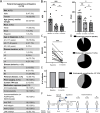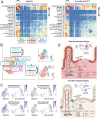Reparative immunological consequences of stem cell transplantation as a cellular therapy for refractory Crohn's disease
- PMID: 39961646
- PMCID: PMC12513369
- DOI: 10.1136/gutjnl-2024-333558
Reparative immunological consequences of stem cell transplantation as a cellular therapy for refractory Crohn's disease
Abstract
Background: Treatment strategies for Crohn's disease (CD) suppress diverse inflammatory pathways but many patients remain refractory to treatment. Autologous haematopoietic stem cell transplantation (SCT) is an emerging therapy for medically refractory CD though the mechanisms through which it circumvents refractory pathophysiology are unknown.
Objective: The objective of this study is to understand how the immune system reconstitutes post-SCT and whether SCT may function as a cellular therapy restoring appropriately responsive immune cell populations from haematopoietic stem cells (HSCs).
Design: Adults with CD with active clinical and endoscopic disease who failed available medical therapies were enrolled in a phase II study of SCT for refractory CD (n=19). Blood and intestinal samples were collected longitudinally and analysed using CyTOF and scRNA-seq. Stem cell autografts were functionally assayed in mouse xenograft models.
Results: scRNA-seq and CyTOF analyses reveal that SCT predominantly affected the intestinal myeloid lineage with loss of inflammatory populations and return of macrophages capable of supporting mucosal healing. Xenograft models using patient HSCs suggested that HSCs support the early reconstitution of the myeloid lineage and reveal an impairment of short and long-term HSC engraftment that may determine SCT outcomes.
Conclusions: This study suggests SCT functions as a myeloid-directed cellular therapy reinforcing the critical role of macrophages in refractory CD pathophysiology and as a target for cellular therapies. Furthermore, we report an unrecognised functional heterogeneity among HSC subpopulations in CD that may be relevant to our understanding of CD treatment and pathophysiology.
Keywords: AUTOIMMUNE DISEASE; CROHN'S DISEASE; MACROPHAGES; STEM CELLS.
© Author(s) (or their employer(s)) 2025. Re-use permitted under CC BY-NC. No commercial re-use. See rights and permissions. Published by BMJ Group.
Conflict of interest statement
Competing interests: J-FC reports receiving research grants from AbbVie, Janssen Pharmaceuticals, Prometheus, Takeda and Bristol Myers Squibb; receiving payment for lectures from AbbVie, and Takeda; receiving consulting fees from AbbVie, Amgen, AnaptysBio, Allergan, Arena Pharmaceuticals, Boehringer Ingelheim, Bristol Myers Squibb, Celgene Corporation, Celltrion, Eli Lilly, Ferring Pharmaceuticals, Galmed Research, Glaxo Smith Kline, Genentech (Roche), Janssen Pharmaceuticals, Kaleido Biosciences, Immunic, Invea, Iterative Scopes, Merck, Landos, Microba Life Science, Novartis, Otsuka Pharmaceutical, Pfizer, Protagonist Therapeutics, Prometheus, Sanofi, Seres, Takeda, Teva, TiGenix, Vifor; and hold stock options in Intestinal Biotech Development. JEL reports receiving research funding from Genentech and VectivBio, receiving consultant fees for Forte Biosciences, Incyte, Mesoblast, and Sanofi, and royalties from GVHD biomarker patent. LC reports receiving consultant fees for Orchard Therapeutics and ORGANOIDSCIENCES; receiving research grants from Bristol Myers Squibb; receiving payment for lectures from Ferring Pharmaceuticals and Takeda. JC reports receiving consultant fees for Orchard Therapeutics.
Figures






Update of
-
The reparative immunologic consequences of stem cell transplantation as a cellular therapy for refractory Crohn's disease.bioRxiv [Preprint]. 2024 Jun 3:2024.05.30.596699. doi: 10.1101/2024.05.30.596699. bioRxiv. 2024. Update in: Gut. 2025 May 7;74(6):894-905. doi: 10.1136/gutjnl-2024-333558. PMID: 38895305 Free PMC article. Updated. Preprint.
References
-
- Alexander T, Greco R. Hematopoietic stem cell transplantation and cellular therapies for autoimmune diseases: overview and future considerations from the Autoimmune Diseases Working Party (ADWP) of the European Society for Blood and Marrow Transplantation (EBMT) Bone Marrow Transplant. 2022;57:1055–62. doi: 10.1038/s41409-022-01702-w. - DOI - PMC - PubMed
Publication types
MeSH terms
Grants and funding
LinkOut - more resources
Full Text Sources
Medical
